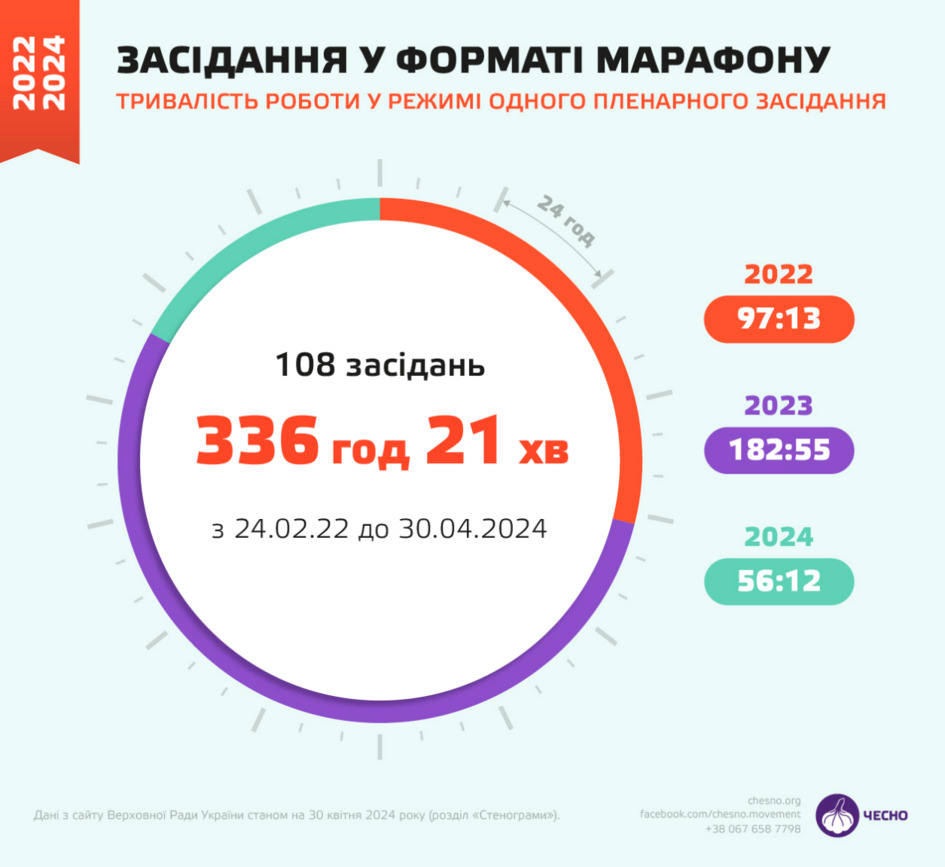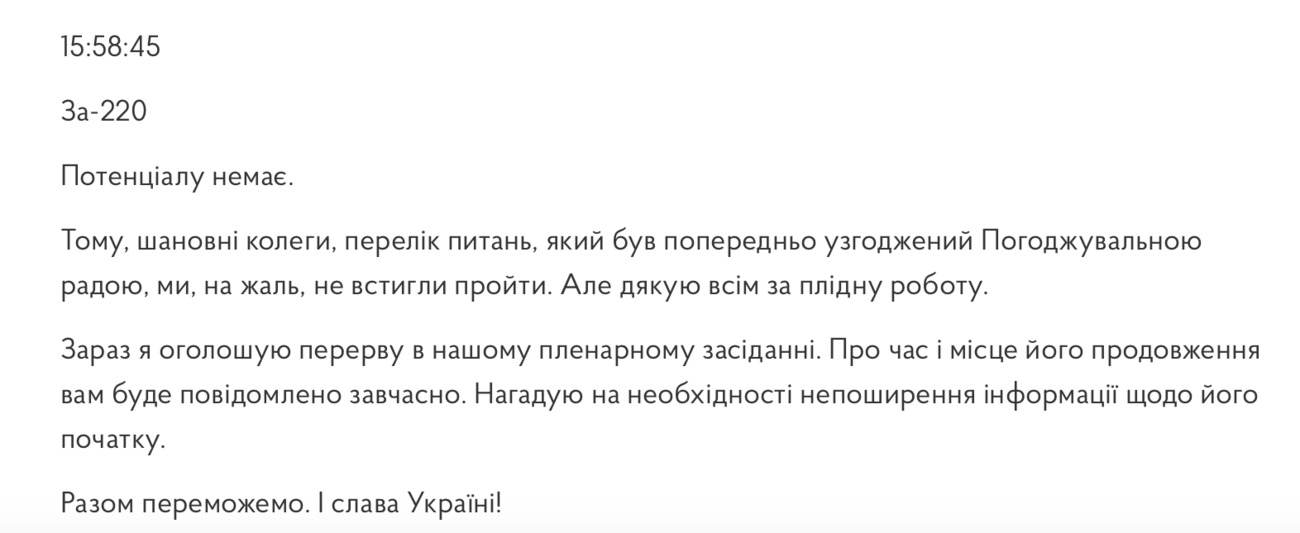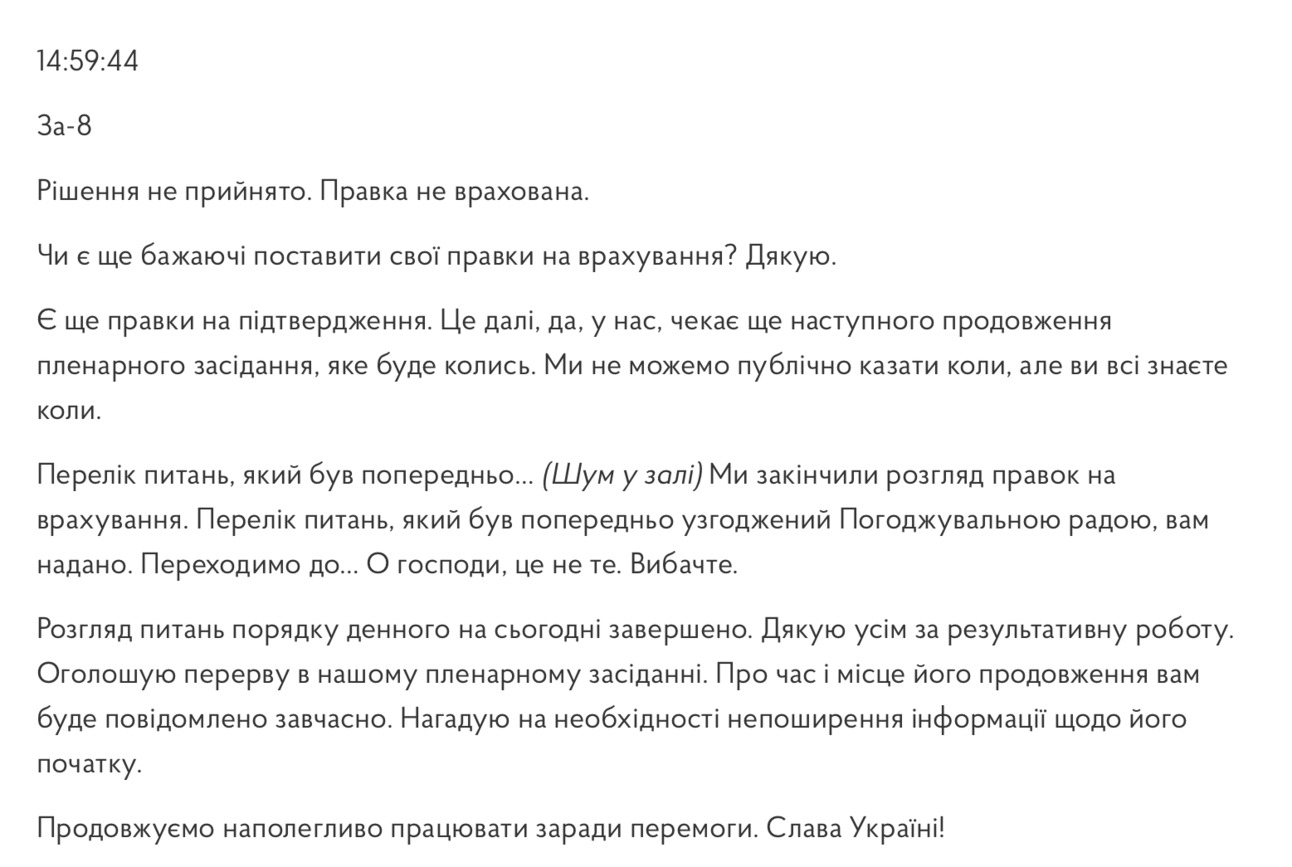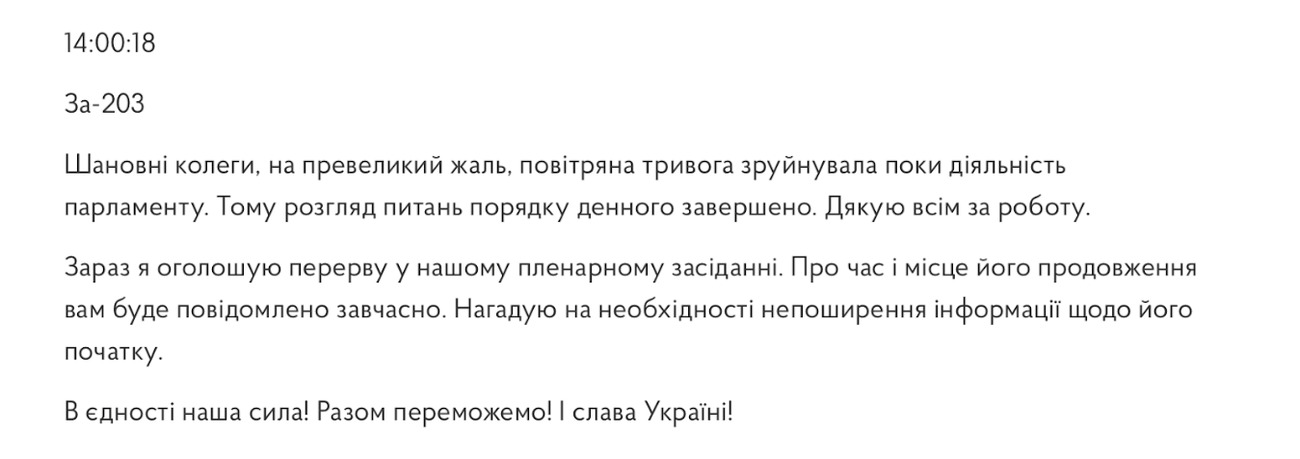Насколько эффективен формат одного заседания Верховной Рады, которое уже длится более двух лет
Верховная Рада уже более двух лет работает в режиме одного пленарного заседания, продолжительность которого сейчас составляет более 336 часов.
Конечно, за это время депутаты сделали много перерывов, а также успели неоднократно обсудить конституционность такого формата работы. Отдельный вопрос — основания для объявления перерывов в заседании. Иногда они предсказуемы, как, например, ситуация, когда рассмотрены все вопросы повестки дня.
Чаще основания для перерывов в заседании Верховной Рады за этот период были неожиданными и даже случайными. В частности во время нескольких заседаний основанием для объявления перерыва, по словам председательствующего, стало «отсутствие потенциала», а еще несколько раз деятельность Рады «разрушала воздушная тревога».
Однако иногда депутаты находят силы и мотивацию работать без перерывов 12-13 часов подряд. На одном из таких заседаний нардепы даже просили короткий перерыв, чтобы «ответственные народные депутаты, присутствующие в зале, могли удовлетворить свои естественные потребности».
Что такое «продолжающееся пленарное заседание» и помогает ли такой формат работы нардепам эффективно работать, читайте в материале Движения «Честно».
Многолетнее заседание
Около 10 вечера 23 февраля 2022 года председатель Верховной Рады Руслан Стефанчук объявил внеочередное заседание парламента закрытым. А уже утром началось новое заседание, во время которого депутаты почти конституционным большинством голосов поддержали предложение председательствующего не закрывать, а продолжать его. Тогда же депутаты предоставили председательствующему право определять время, место проведения и способ голосования в дальнейшем во время заседания. Это голосование было единственным, которое приняли в первый день полномасштабного вторжения, кроме голосования о введении военного положения.
С тех пор депутаты 104 раза собирались для работы в сессионном зале, и каждый раз председательствующий объявлял о перерыве в заседании под конец рассмотрения вопросов. С начала 2022 года до апреля 2024 года в сессионном зале Верховной Рады народные депутаты работали более 336 часов.

Такой формат работы сейчас закреплен в отдельном постановлении парламента. Там также определены правила формирования проекта повестки дня на день после перерыва в продолжающемся заседании и продолжительность времени для рассмотрения вопросов.

Постановление также предусматривает, что присутствующие на продолжающемся заседании в день после перерыва не должны распространять информацию о его начале, ходе и принятых решениях ранее чем через час после объявления перерыва. Однако, как мы знаем, не все народные депутаты соблюдают эти требования.
Законодательство & реальность
Согласно этому же постановлению, детали заседания парламента до объявления перерыва должен определять согласительный совет, который устанавливает время, необходимое для рассмотрения вопросов повестки дня. Однако, если воздушная тревога длится более трех часов, то заседание прекращается без рассмотрения запланированных вопросов или исчерпания времени. Однако на практике, как видим из стенограмм, перечень оснований для объявления перерыва в продолжающемся заседании значительно шире.
Иногда в таком заседании все же объявляется перерыв, когда депутатам удается рассмотреть все вопросы повестки дня, даже если принять их не удалось. Так, во время одного из таких заседаний последний пункт повестки дня набрал лишь 223 голоса. После чего председательствующий подчеркнул, что он «старался».

Иногда заседание завершается, даже если рассмотреть все инициативы не удалось, но исчерпано запланированное время. В таких случаях рассмотрение вопросов повестки дня может быть перенесено, ведь календарного плана заседаний нет. Общественности приходится ожидать рассмотрения того или иного решения неопределенное время, пока депутаты не сообщат в своих соцсетях о возвращении в сессионный зал на заседание после перерыва.

«Потенциал» нардепов или его отсутствие также часто становится основанием для объявления перерыва в заседании. Обычно это происходит, если в зале недостаточно депутатов для принятия решений. Такие перерывы могут объявлять, если в зале менее десяти депутатов или даже если присутствуют более двухсот нардепов. При обоих условиях принять ни одно решение парламент не сможет.

В то же время, если в парламенте рассматривают поправки к законопроектам, что нередко занимает десятки часов, председательствующий не спешит объявлять перерыв. Так, при обсуждении поправок к закону о мобилизации (№ 10449) парламент хоть и работал до ночи, однако фактически в сессионном зале работали лишь около трех десятков нардепов. Подобная картина в сессионном зале очень часто наблюдается именно при рассмотрении так называемого поправочного спама.

Чаще всего рассмотрение поправок происходит в почти пустом сессионном зале. Вероятно, это обусловлено тем, что нардепы не считают их рассмотрение важным и сознательно игнорируют такие заседания. Поэтому не по всем запланированным поправкам нардепы настаивают на рассмотрении, ведь на их принятие нет шансов.

Заседание во время воздушных тревог
За последние несколько месяцев участились случаи прерывания заседаний Верховной Рады из-за объявления воздушной тревоги. В постановлении, регламентирующем правила их проведения во время военного положения, предусмотрено, что депутаты должны вернуться в сессионный зал в течение 15 минут с момента объявления отбоя тревоги. Но иногда продолжить работать в этот день не удается.
В зал возвращаются не все депутаты, и в результате голосовать за принятие решений уже невозможно. Чтобы избежать провала в важных голосованиях, председательствующий оценивает количество присутствующих нардепов и может принять решение об объявлении перерыва.

Учитывая такую практику, иногда председательствующий уже после начала воздушной тревоги, не дожидаясь ее завершения, объявляет перерыв в заседании. Он сразу отмечает, что собраться после завершения тревоги депутаты уже не смогут, поэтому работа прекращается уже на этом этапе. При таких условиях даже запланированные для рассмотрения вопросы приходится откладывать.
Продолжающееся заседание действительно имеет преимущества в смысле оперативности сбора депутатов для рассмотрения вопросов в сессионном зале в случае необходимости, но вместе с тем делает невозможным четкое планирование, создает основания для отложения решений и является прекрасным форматом оправдания закрытости работы.
Какая перспектива?
С начала этого года в Верховной Раде происходят определенные изменения в формате работы, к которым неоднократно призывали как представители общественности, так и сами нардепы. Так, недавно в Раде зарегистрировали проект постановления, в котором нардепы требуют завершить режим одного пленарного заседания и вернуться к формату классических пленарных заседаний с двумя пленарными неделями, согласительным советом и часом вопросов к правительству, которые определены регламентом. Однако мнения нардепов по этому поводу разнятся.
Первый заместитель председателя парламента Александр Корниенко в комментарии «Честно» отмечает, что этот формат, созданный в день начала полномасштабного вторжения, очень гибкий и позволяет собраться в любой момент. Зато календарный план таких возможностей не дает, хотя законодательство и предусматривает инструменты для созыва внеочередных заседаний: «Формат продолжающегося заседания — это не прихоть главы парламента. Это определено постановлением, которое несколько раз поддерживали депутаты. Пока мы находимся в режиме военного положения, работа будет продолжаться в таком формате. И все же кто следит за работой парламента, знает, что количество заседаний и часов работы подобно времени 2020-2021 годов. Сейчас график заседаний возвращается к предыдущим показателям, а последние заседания вообще проходили три дня подряд, а на четвертый мы имели час вопросов к правительству. Это полное соответствие формату работы, который мы имели до полномасштабного вторжения».
Позицию руководства парламента разделяют и другие нардепы. В частности председатель Комитета по вопросам свободы слова Ярослав Юрчишин отмечает, что непрерывность заседания позволяет быстро, в пределах 24 часов, собрать депутатов в сессионном зале. В начале полномасштабного вторжения такой формат работы был критически необходим, чтобы быстро созвать депутатов для решения неотложных вопросов, рассмотрение которых было невозможно запланировать заранее.
«Сейчас, с усилением безопасности в Киеве и противовоздушной обороны, потребность в коротких заседаниях отпала и возвращение к календарному плану работы вполне реалистично. Последнее заседание уже состоялось в таком формате и показало, что это достаточно взвешенное и адекватное решение. Насколько я понимаю, в мае будет проходить эксперимент по возвращению в традиционный рабочий формат. После этого мы, вероятно, вернемся к календарному режиму работы, но с возможностью оперативно собираться на заседания», — отмечает Юрчишин.
Напомним, движение «Честно» проанализировало все заседания Верховной Рады с начала 2022 года и до сих пор, а также подсчитало, сколько нардепы работали в сессионном зале Рады. Как показывает анализ заседаний и рабочих часов парламента, постепенно нардепы наращивают количество и продолжительность заседаний.
При таких условиях возможно и возвращение к календарному плану работы Верховной Рады, а также восстановление допуска журналистов к стенам парламента и трансляций заседаний. Такие условия работы однозначно повлияют на дисциплинированность нардепов, ведь речь пойдет о репутации каждого из них.


